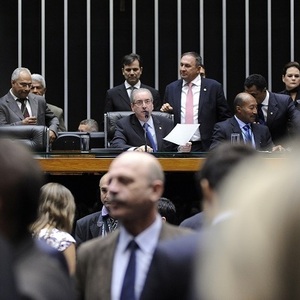Brazil House approves increasing biodiesel mandate to 10 percent

Photo: Alex Ferreira, Câmara dos Deputados
March 3, 2016
BY Ron Kotrba
Brazil’s House of Representatives approved a measure March 3 to increase the mandatory percentage of biodiesel required in diesel fuel by 1 percent a year, from 7 percent today to 10 percent in three years.
Deputado Evandro Gussi said since the bill was negotiated with the Ministry of Mines and Energy, he fully expects President Dilma Rousseff to sign the legislation into law.
Advertisement
Advertisement
The measure leaves the door open to reach 15 percent biodiesel once positive engine test results are obtained, provided such a hike is approved by National Energy Policy Council.
The proposal also allows NEPC to authorize the use of higher blends on a voluntary basis in public transportation, mining equipment, power generation, tractors and other agricultural equipment.
“The biodiesel mandate increase in Brazil clearly confirms the country’s leading position in developing a solid renewable energy matrix, which relies on hydroelectric, solar, wind and biomass-based power as alternatives to conventional energy sources,” said Carlos Araujo, the North American marketing manager at Evonik Corp., a global supplier of sodium methylate catalyst to the biodiesel industry. Evonik built a new catalyst plant in Argentina that started production in 2013 with what Araujo said was a clear focus to supply both Argentinean and Brazilian biodiesel markets.
Advertisement
Advertisement
“The government decision also brings certainty and clarity to the biodiesel value chain by establishing a path in the horizon,” Araujo said. “With a defined plan and deadline, feedstock producers, biodiesel producers, distributors and regulatory agencies will be able to implement the necessary infrastructure and control measures to assure the progressive growth to B10. Most importantly, Brazil will achieve a significant improvement in reduction of greenhouse gas emissions and also of public health issues related to air pollution.”
Biodiesel Magazine first covered this legislative development last November when a special committee on national development unanimously approved the senate bill.
Related Stories
Broco Energy on July 17 announced a new partnership with the Massachusetts Port Authority (Massport) to deliver and transition Massport's fuel tanks to renewable diesel across its various facilities.
Shell Aviation, Accenture, and Amex GBT on July 10 announced Avelia is in the process of evolving to an industry solution with independent data hosting and a multi-supplier model helping users access the GHG benefits of SAF.
The U.S EPA on July 17 released data showing more than 1.9 billion RINs were generated under the RFS during June, down 11% when compared to the same month of last year. Total RIN generation for the first half of 2025 reached 11.17 billion.
The U.S. EPA on July 17 published updated small refinery exemption (SRE) data, reporting that six new SRE petitions have been filed under the RFS during the past month. A total of 195 SRE petitions are now pending.
Avia Solutions Group, the world's largest ACMI (aircraft, crew, maintenance, and insurance) provider, has partnered with DHL Express to reduce greenhouse gas emissions from its international shipments using SAF.
Upcoming Events










